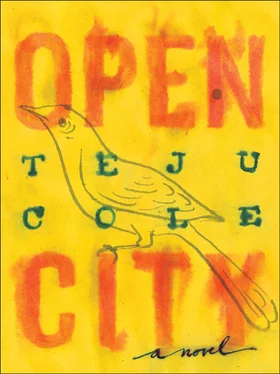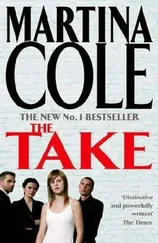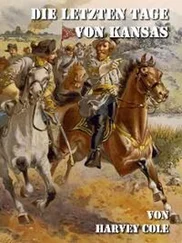The gate at the front of the church was locked. I walked along the railing, first north then, when I couldn’t find an entrance there, south. There was a large graveyard that encompassed both sides of the church, white headstones, black ones, and a few monuments, among which Alexander Hamilton’s was prominent: THE PATRIOT OF INCORRUPTIBLE INTEGRITY, THE SOLDIER OF APPROVED VALOR, THE STATESMAN OF CONSUMMATE WISDOM, WHOSE TALENTS AND VIRTUES WILL BE ADMIRED. It gave the date — July 12, 1804—as well as his age, forty-seven. Hamilton, actually forty-nine when he died of the single gunshot wound he received in the duel with Burr, was not the only famous person interred in the Trinity churchyard. Among the stones were also those commemorating John Jacob Astor, Robert Fulton, and the abolitionist George Templeton Strong, whose memoirs of late-nineteenth-century life in the city I had once seen on my friend’s shelves. And then there were many women from those few centuries since the Europeans had come up the Hudson and settled on this island, women named Eliza, Elizabeth, Elisabeth. Some of them had died old, many others had died young, often during childbirth or, younger still, of childhood illnesses. There was a large number of children’s graves.
Going around Rector Street, I came onto Trinity Place, where an ancient wall hemmed the church in and the air was cold and smelled of the sea. Trinity Church was chartered in the waning years of the seventeenth century; seafarers in general and whalers in particular had set out on their outbound journeys with the blessings of its congregation. It was to the same church that they returned, if they had been blessed with a safe and prosperous voyage, to give thanks for journeying mercies. One of the many privileges accorded Trinity in those years was full rights over any shipwrecks or beached whales on the isle of Manhattan. The church was near the water. Water loomed close by it in every direction but north. I walked around, looking for an entrance, thinking of these nearby waters. Later, I would find the story recounted by the Dutch settler Antony de Hooges in his memorandum book: On the 29th of March in the year 1647 a certain fish appeared before us here in the colony, which we estimated to be of a considerable size. He came from below and swam past us a certain distance up to the sand bars and came back towards evening, going down past us again. He was snow-white, without fins, round of body, and blew water up out of his head, just like whales or tunas. It seemed very strange to us because there are many sand bars between us and Manhattan, and also because it was snow-white, such as no one among us has ever seen; especially, I say, because it covered a distance of twenty miles of fresh water in contrast to salt water, which is its element. Only God knows what it means. But it is certain, that I and most all of the inhabitants watched it with great amazement. On the same evening that this fish appeared before us, we had the first thunder and lightening of the year.
Fort Orange, from which de Hooges wrote his report, was the settlement that later became Albany, after the British took over the Dutch possessions in this part of the New World. De Hooges wrote of another sighting of a great sea creature in April of the same year. Another writer, the traveler Adriaen van der Donk, reported two sightings, as well as a beached whale, up the Hudson in the Troy area, also in 1647. The latter was plundered for its oil, van der Donk wrote, and its carcass was left to stink up the beach. For the Dutch, though, the sighting of a whale in inland waters, or of its beached hulk on land, was a powerful portent, and de Hooges’s link between the presence of the whales and dramatic weather patterns was typical. His sighting was even more ominous than usual, as the animal he described seemed to have been an albino.
There could hardly have been any seventeenth-century Dutch resident of New Amsterdam and the upriver trading posts who would have been unaware of the numerous whale beachings back home in the Netherlands. In 1598, the fifty-four-foot sperm whale that beached itself in the sandy shallows of Berckhey, near The Hague, had taken four days to die and, in that time and in the weeks afterward, had entered into the legend of a nation at the very beginning of its modern history. The whale of Berckhey was memorialized in engravings, taken as an object of commercial value and, when that was exhausted, scientific curiosity. It was, above all, interpreted as a message from the deep. It was not at all difficult for the people of the day to see a link between this dying monster and the atrocities committed by the hated Spanish troops in the principality of Cleves in August of the same year. Between the mid-sixteenth century and the end of the seventeenth, at least forty whales were beached on the shores of Flanders and the northern Netherlands. For the Dutch, who were attempting, at the time, not only to define their new republic but also to consolidate their hold on New Amsterdam and other foreign possessions, the spiritual meaning of the whale was ever-present.
About two hundred years later, when a young man from the Fort Orange area came down the Hudson and settled in Manhattan, he decided he would write his magnum opus on an albino Leviathan. The author, a sometime parishioner of Trinity Church, called his book The Whale; the subtitle, Moby-Dick , was added only after the first publication. This same Trinity Church had now left me out in the brisk marine air and given me no place in which to pray. There were chains on all the gates, and I could find neither a way into the building nor anyone to help me. So, lulled by sea air, I decided to find my way to the edge of the island from there. It would be good, I thought, to stand for a while on the waterline.

WHEN I CROSSED THE STREET AND ENTERED THE SMALL ALLEY opposite, it was as though the entire world had fallen away. I was strangely comforted to find myself alone in this way in the heart of the city. The alley, no one’s preferred route to any destination, was all brick walls and shut-up doors, across which shadows fell as crisply as in an engraving. Ahead of me was a great black building. The surface of its half-visible tower was matte, a light-absorbing black like that of cloth, and its sharp geometry made it look like a freestanding shadow or cardboard cutout. I walked under some scaffolding in the alley and, from Thames Street, crossed Greenwich, and came to Albany, from which I saw the tower more clearly, although still at some distance. It was completely veiled in a densely woven black net. Where that narrow, quiet street met Washington, I saw to my right, about a block north of where I stood, a great empty space. I immediately thought of the obvious but, equally quickly, put the idea out of my mind.
Shortly afterward, I was on the West Side Highway. I was the only pedestrian at the crossing. The taillights of cars were chased by their red reflections toward the bridges out of the island, and to the right, there was a pedestrian overpass connecting one building, not to another, but to the ground. And again, the empty space that was, I now saw and admitted, the obvious: the ruins of the World Trade Center. The place had become a metonym of its disaster: I remembered a tourist who once asked me how he could get to 9/11: not the site of the events of 9/11 but to 9/11 itself, the date petrified into broken stones. I moved closer. It was walled in with wood and chain link, but otherwise nothing announced its significance. On the other side of the highway was a tranquil, residential street called South End, on the corner of which was a restaurant. It had neon signs outside (I remember the neon, but I forget the restaurant’s name) and, when I peered in through the glass doors, I saw that it was mostly empty. The few patrons, it seemed, were all men, and most sat alone. I went inside, and sat at the bar, and ordered a drink from the waitress.
Читать дальше













